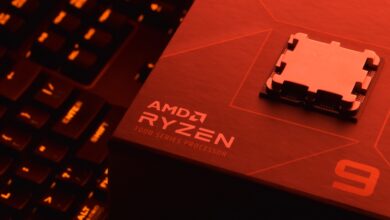3 Artificial Intelligence (AI) Stocks Warren Buffett “Secretly” Owns

Warren Buffett’s secret $646 million portfolio contains more than seven-dozen securities — three of which happen to be market-leading artificial intelligence (AI) stocks.
For the last six decades, Berkshire Hathaway (BRK.A 0.37%) (BRK.B 0.64%) CEO Warren Buffett has been dazzling Wall Street with his investing prowess. Whereas the benchmark S&P 500 has delivered a respectable gain, including dividends, of a little over 35,000% since Buffett took over as CEO, the affably named “Oracle of Omaha” has overseen an aggregate return in his company’s Class A shares (BRK.A) of almost 5,000,000%!
When you’re absolutely crushing Wall Street’s widely followed stock indexes, you’re bound to draw a lot of attention. It’s why 40,000 people flock to Berkshire Hathaway’s shareholder meeting each year, and it’s what compels investors to seek out Berkshire’s quarterly Form 13F filings.
A 13F provides investors with an over-the-shoulder look of what Wall Street’s brightest investment minds have been buying and selling in the most recent quarter. However, Berkshire Hathaway’s 13Fs fail to tell investors the complete story of what’s under the hood.
Berkshire Hathaway CEO Warren Buffett. Image source: The Motley Fool.
The Oracle of Omaha’s “secret” $646 million portfolio contains a trio of artificial intelligence (AI) stocks
In 1998, Buffett’s company acquired General Re for $22 billion. While the purpose of this transaction was for Berkshire to get its hands on General Re’s reinsurance operations, it also owned a specialty investment company at the time: New England Asset Management (NEAM). When Berkshire completed the buyout of General Re, it became the new parent of NEAM.
Although most professional and everyday investors are rightly focused on the 44-stock, $379 billion portfolio Warren Buffett oversees for Berkshire Hathaway, there’s a 90-security, $646 million portfolio overseen by New England Asset Management, as well. The stocks NEAM holds are, ultimately, part of Berkshire Hathaway, which is what makes this Buffett’s “secret” portfolio.
While most of the securities contained in this $646 million secret portfolio are exchange-traded funds (ETFs) or time-tested businesses, you might be surprised to learn that there are also holdings with very clear artificial intelligence (AI) ties. AI involves the use of software and systems in place of humans, and allows for these systems to learn and evolve over time without human intervention.
Say hello to the three artificial intelligence stocks Warren Buffett “secretly” owns in this $646 million portfolio.
Alphabet
The first AI stock you’ll find in the Oracle of Omaha’s hidden portfolio is none other than “Magnificent Seven” member Alphabet (GOOGL -1.28%) (GOOG -1.35%). Alphabet is the parent of internet search engine Google, streaming site YouTube, autonomous driving company Waymo, and cloud infrastructure service platform Google Cloud. New England Asset Management held 10,500 Class A shares (GOOGL) of Alphabet, as of the end of March.
Virtually all aspects of Alphabet’s operating segments utilize AI. However, the most-profitable application is likely to be the use of generative AI solutions for Google Cloud. Subscribers can lean on these solutions to personalize their marketing efforts, as well as summarize large documents and deploy virtual chat agents.
The foundation to Alphabet’s success continues to be its ad-driven operating segments. Google has tallied at least a 90% monthly share of worldwide search for the last nine years. This makes it the logical go-to for businesses looking to target consumers with their message(s).
Likewise, YouTube is the second most-visited social site on the planet, with around 2.5 billion monthly active users. More eyeballs will make it progressively easier for YouTube to command stronger ad-pricing power.
However, the future for Alphabet rests heavily on the success of Google Cloud, which is the global No. 3 cloud infrastructure service provider. Google Cloud enjoyed its first year of profitability in 2023, and should deliver rapid growth in operating cash flow as AI fuels revenue expansion.
Broadcom
A second artificial intelligence stock you’ll find in Warren Buffett’s secret portfolio is Broadcom (AVGO 0.38%). As of the end of March, NEAM held 3,970 shares of this semiconductor behemoth, worth close to $5.3 million.
The reason Broadcom’s stock has surged by 153% since the start of 2023 is almost entirely because of its role in the AI revolution. In April 2023, it unveiled its Jericho3-AI chip, which can connect up to 32,000 high-powered graphics processing units (GPUs). Jericho3 is designed to minimize tail latency and help facilitate the split-second processing needed for training large language models and operating generative AI solutions in high-compute data centers.
Beyond AI, a significant percentage of Broadcom’s sales and profits come from selling wireless chips and other accessories used in next-generation smartphones. When wireless carriers upgraded their networks to support 5G speeds, it rolled out the red carpet for consumers and businesses to upgrade their wireless devices. This ongoing replacement cycle has fueled demand for Broadcom’s smartphone solutions.
Furthermore, Broadcom has continued to expand its reach beyond data centers and smartphones. It offers automotive solutions, which includes advanced driver assistance systems, as well as a variety of enterprise security offerings.
Broadcom’s sizable backlog leads to predictable operating cash flow year after year.
Image source: Getty Images.
Microsoft
The third artificial intelligence stock Warren Buffett secretly owns via New England Asset Management is Wall Street’s largest public company (at the time of this writing), Microsoft (MSFT -0.16%). NEAM closed out March with 13,210 shares of Microsoft, which was worth close to $5.6 million.
AI represents an essential footprint of Microsoft’s future growth plans. It’s made multiple investments in OpenAI, the company behind the ultra-popular chatbot, ChatGPT. Further, Microsoft is developing its own Ai chips: the Azure Maia 100. These AI chips will be deployed in Microsoft’s AI-accelerated data centers.
What’s made Microsoft such a money machine for so long has been its ability to reap the rewards of its legacy segments while reinvesting its operating cash flow for the future. For example, even though Windows and Office aren’t the growth stories they once were, they still generate exceptionally high margins and boatloads of cash flow that Microsoft can reinvest in faster-growing aspects of its business.
Aside from specifically investing in AI, Microsoft has devoted a lot of capital to building out its cloud-based services. Azure was the global No. 2 in cloud infrastructure service spending, as of the end of 2023, per tech-analysis firm Canalys. Constant-currency sales growth for Azure has consistently hovered around 30%!
Lastly, Microsoft (like Alphabet) is sitting on an absolute mountain of cash. It ended March with $80 billion in cash, cash equivalents, and short-term investments, and has generated a cool $110 billion in operating cash flow over the trailing-12-month period. Microsoft’s balance sheet and cash flow gives it the luxury to aggressively invest in new innovations, as well as make acquisitions to further its efforts.



